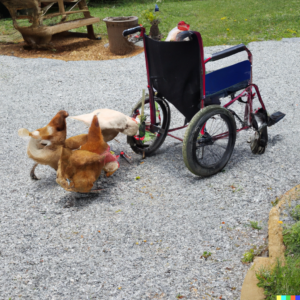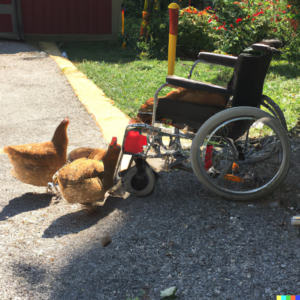This story was inspired by a silly fun conversa tin with The Artistic Director of The National Disability Theater and The Curiosity Paradox while reflecting on the The NDT Handbook. What if instead of “access check-in” we had said “access chicken” ?
The Access Chickens

Once upon a time, on a bright and lively farm, there lived a bunch of extraordinary chickens who loved reading books. Inside their cozy coop, they had shelves filled with stories of all kinds. One sunny day, while exploring the library, they found a magical book called “Skin Tooth and Bone” by Sins Invalid. As they read it together, they discovered the magic of Disability Justice and the importance of making the farm accessible to everyone, no matter their differences.
The chickens were so inspired by the book that they decided to share its wisdom with the other animals and their human family. They gathered all the creatures near the big apple tree, eager to spread the message of inclusion.
Feathers, the bravest chicken, stood up and said, “Dear friends, we have found something extraordinary in this magical book. It’s all about Disability Justice, and together, we can make our farm a wonderful place for everyone!”
The animals gathered around, listening intently, and Feathers explained the first principle, “Intersectionality.” “This means that we all have different identities and experiences. Just like our feathers have various colors, we should celebrate our differences and learn from each other.”
The chickens noticed that their friend, Dotty the duck, had a unique way of moving with her webbed feet. So, they made sure to create paths that were easy for both chickens and ducks to walk on, making it accessible for all.
“Now,” Feathers continued, “we must follow the ‘Leadership of Those Most Impacted.’ This means we listen to and follow the lead of those who understand the challenges best.”
The chickens knew that their friend, Charlie the goat, had the most experience navigating the farm with his unique hooves. So, when planning the farm’s changes, they asked Charlie for his ideas and suggestions to make it more accessible for him and others like him.
They learned about “Anti-Capitalist Politic,” which meant challenging the idea that everything should be about making money. They understood that making the farm accessible was about caring for each other, not just about profit.
The chickens decided to build a comfortable shelter for all the animals to rest during hot days. They used materials they already had on the farm, like hay and recycled wood, rather than buying expensive items.
The chickens believed in the “Commitment to Cross-Movement Organizing,” which meant working together with other groups who care about fairness and kindness for all.
The chickens collaborated with the farmer’s family, who were part of a community group that supported accessible spaces for everyone. Together, they organized workshops for other farms to learn about creating inclusive environments.
The chickens understood “Recognizing Wholeness,” which meant valuing each animal for their unique selves, not just for what they can do.
The chickens admired their friend, Emma the rabbit, who had a different way of hopping. They celebrated her hopping skills and built a ramp so she could easily join them on the soft grass.
They learned about “Sustainability,” which meant taking care of themselves and the farm so they could keep making it better for everyone, not just for a short time.
The chickens took breaks while working on the changes. They rested and ate healthy food to keep their energy up, so they could continue making the farm accessible for the long term.
The chickens embraced “Commitment to Cross-Disability Solidarity,” which meant standing together and supporting all animals with disabilities.
The chickens and other animals worked as a team to make changes that helped everyone. For instance, they created a communal watering spot so animals with different needs could all quench their thirst together.
They believed in “Interdependence,” which meant understanding that they all needed each other to thrive.
The chickens knew that their friends, the bees, played a crucial role in pollinating flowers. They worked together to create accessible flower beds, making sure the bees could reach the flowers easily.
They embraced the idea of “Collective Access,” which meant making sure that everything on the farm was accessible for all animals.
The chickens placed colorful signs with pictures around the farm, showing the way to various spots. This helped animals of all languages and abilities find their favorite places easily.
The chickens learned about “Collective Liberation,” which meant working together for freedom and fairness for everyone.
The chickens and other animals celebrated their differences and stood together, showing the world that when they work as a team, they can create a wonderful and accessible farm for all to enjoy.
And so, the fantastic farmyard journey continued, as the chickens and their friends embraced the Principles of Disability Justice. Together, they made the farm a joyful and inclusive place, where everyone felt valued and cherished, just as they were.

